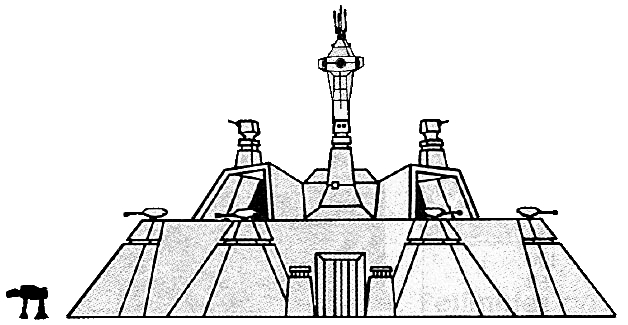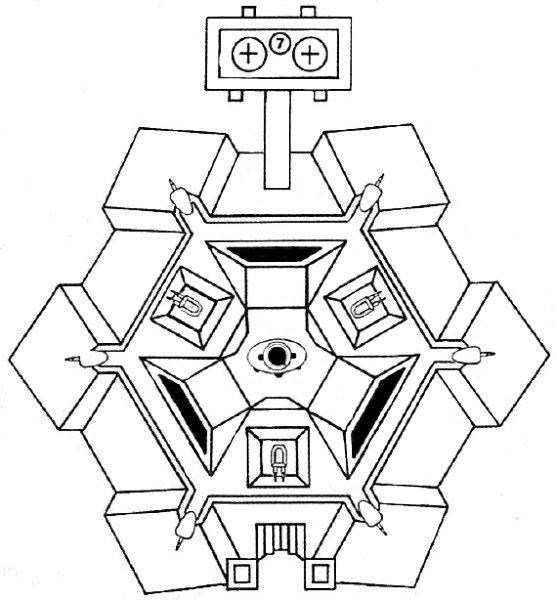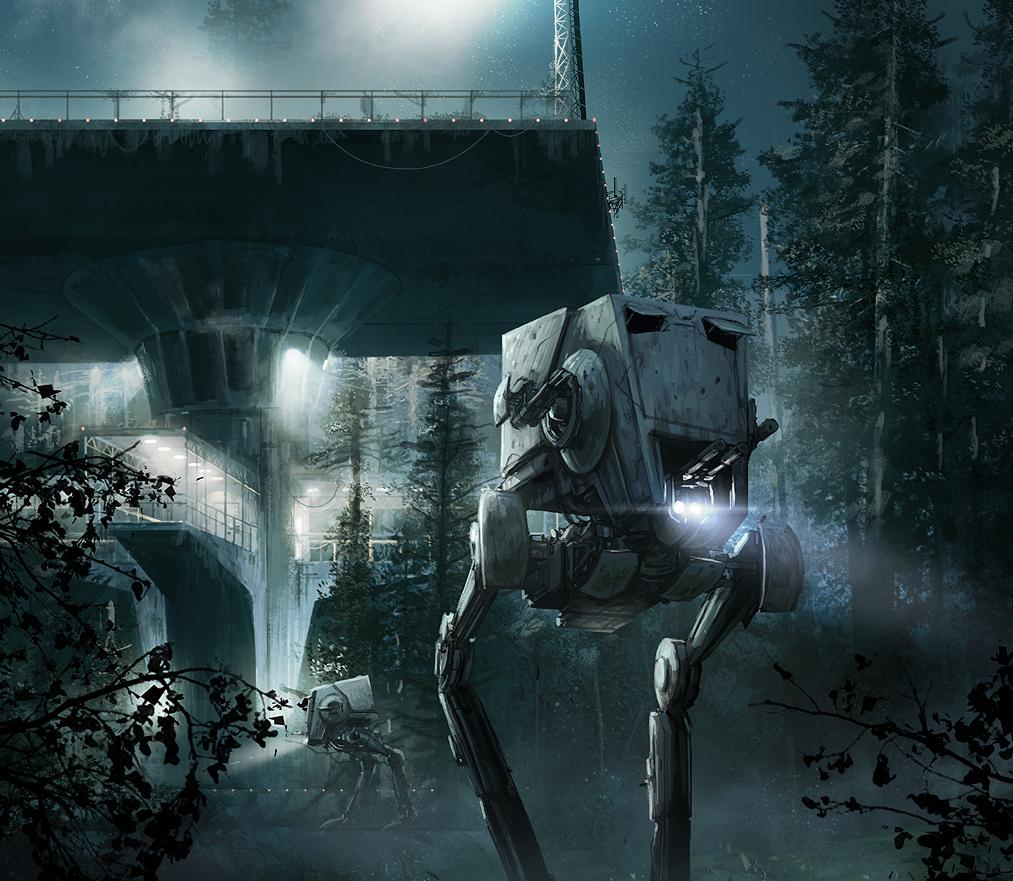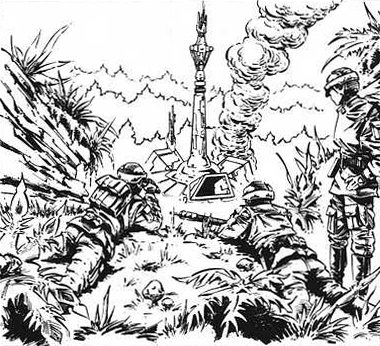The IM-455 modular garrison, also known as The Peacekeeper, was the Empire's standard base deployed on planets to keep the peace and serve as a home for its troops. It was built by Rothana Heavy Engineering as a rewarded manufacturing contract, and its main purpose was to allow an Imperial Army commander to achieve the same results of turning a venerated political/religious structure into the seat of power for the Empire on a world and at the same time allow for optimized defense. A standard Imperial garrison was elevated for observation and angled for defense, and acted as a symbol to rebellious populations that the Empire wasn't going anywhere.

Schematic of an IM-455 modular garrison
Garrison bases consisted of eight levels, topped by a sensor and communications tower. Levels one through to five, all identical in size and shape, consisted mainly of the large surface vehicle bays where all the surface vehicles were stored, maintained and deployed from. The vehicle bays were large enough to accommodate AT-ATs. They also contained most of the personnel quarters as well as the armory, detention cells and most other key base areas. It also contained a recreation center, which by 0 BBY added a scoopball court by popular request.
Level six held the officers' quarters, TIE fighter pilots' quarters, command rooms and so on. Level seven consisted entirely of the TIE/LN starfighter hangars. Level eight was the deployment chutes and control rooms for the base's TIEs. TIEs were launched, retrieved and manipulated by the base's powerful suite of tractor-beam projectors. Garrison bases also had underground sub-levels which contained the generators (including the main reactor) and main infrastructure. The roof contained the sensor suite tower, which was equipped with a hypercom array as well as Rothana's patented mix of thermo-infra-ecto multivariate sensors.
Although the basic garrison was a standardized model, several variations existed:
The shield projector garrison was a model that was utilized for Imperial orbital construction projects, where it projected an uninterrupted energy shield around the orbital site. It had enough defenses to put down planetside uprisings from the conscripted workforce. It includes a command garrison, which was broken down into several smaller structures similar to the IM-445, albeit with an armored bunker to house the generator; a 20-meter-tall landing pad to accommodate docking AT-ATs as well as two to three Lambda-class shuttles; and the SLD-26 planetary shield generator.
An aquatic model, the oceanic garrison, lacked the underground levels and had several powerful repulsorlifts to keep it afloat. In addition, it was equipped with underwater hangar bays. The contingent included seatroopers and AT-AT swimmers.
An orbiting garrison was two standard garrisons locked together base-to-base, but this variation was rarely deployed. These garrisons were only deployed in orbits around extremely hostile and dangerous planets. This provided the troops on the ground with an orbital fire base and also made the headquarters extra secure. Orbiting Garrisons could support a full TIE wing and several orbital tugships. Since the garrisons lacked engines, the tugs were the only means of propulsion.
However, orbiting garrisons created a controversy with the Navy, which considered all space-deployed units their jurisdiction. In the end, the command on orbiting garrisons was split between Navy and Army, with one base commanded by an Admiral, the other one by a Major General. Additionally, a new orbital defense platform for the Navy was put into production.
For planets with unfriendly climate, the hostile-environment garrison was equipped with sealed airlocks on all entry points on an extra life-support sub-level.
Several standard garrisons could be deployed in proximity to form a garrison complex. The buildings would be connected via underground tunnels and walkways. The largest complexes were constructed of up to six garrisons arranged in a ring. Like orbiting garrisons, these complexes were rarely constructed. Only worlds of major strategic importance required such a great headquarters. Most complexes were headquarters of an Army, a Systems Army, or a Sector Army and commanded by a General.

A top view of the Garrison Base
Imperial garrisons were commanded by a Major General and housed 3000 base personnel divided as follows:
- 300 command personnel
- 500 support/services personnel
- 200 technical personnel
- 200 science personnel
- 100 medical personnel
- 100 gunners/weapons technicians
- 80 walker technicians
- 70 trade mission/diplomatic personnel
- 60 ground crew technicians
- 25 controllers
- 25 sensor technicians
- 10 speeder bike technicians
- 50 Imperial Intelligence officers
The numbers of specific staff were flexible to the mission's needs.
- 50 walker crews
- 40 TIE fighter pilots
- 800 stormtroopers
- 200 perimeter support troops
- 150 base security/detention troops
- 40 scout troopers

AT-STs patrol the garrison base on Endor
- 30 TIE/LN starfighters and 5 TIE bombers/36-40 TIE fighters (three squadrons)
- 10 AT-ATs
- 10 AT-STs
- 50-100 speeder bikes and/or landspeeders
- 100 miscellaneous vehicles (construction, cargo, maintenance, etc.)
Garrison bases were equipped with three heavy twin turbolaser turrets and six heavy laser turrets, as well as tractor beam projectors.
Though shielded, garrisons also possessed extensive ground defenses such as anti-infantry and anti-vehicle minefields and a ten-meter high electrified death fence. This had variable power settings, so it could either severely shock an individual or fry them outright in an instant, depending on the base commander's choice.
To get through the fence and into the base, units had to pass through force field gates. These were flanked by two guard towers with stormtroopers on constant duty and positioned evenly around the fence's perimeter. Running behind the fence and parallel to it was an elevated catwalk patrolled by stormtroopers with guard towers (each equipped with electrobinoculars, floodlights, and alarm systems) spaced every 100 meters.
Some garrison bases were positioned to use the terrain to their advantage, such as setting them into mountainsides or on outcroppings. These tailored their ground defenses accordingly. Garrison bases also possessed air recyclers and advanced environment and filter systems allowing them to be deployed almost anywhere, from hostile worlds to asteroids.

A garrison is attacked by forces of the Alliance to Restore the Republic.
Boba Fett once took an to capture a criminal, conveniently the brother of a base commander, on the order of Jabba the Hutt. His actions to capture the criminal forced him to destroy most of the base, including two AT-ATs, two AT-STs, and the commanding general. The engagement gave the criminal time to escape. As a result of this, although the Imperials denied the rumors of Boba Fett breaching the garrison, they nonetheless developed and distributed a defensive upgrade called XZD-001: FETT COUNTERMEASURES as a result.
Star Destroyers like the Imperial-class could carry one of these installations, while an Executor-class Star Dreadnought could carry up to three. Prefabricated bases were dropped from orbit in ready-made pieces and assembled on-site by Imperial engineers and construction droids. The Y-85 Titan dropship was essential to this purpose onboard Imperial ships larger than Star Destroyers.
Han Solo claimed that he and Chewbacca infiltrated the garrisons more than once, and even offered to aid fellow New Republic general Crix Madine in training various troops on how to do so. Madine, however, was skeptical of this claim, even telling Solo that he would have borrowed a holothriller if he wanted fiction in response.